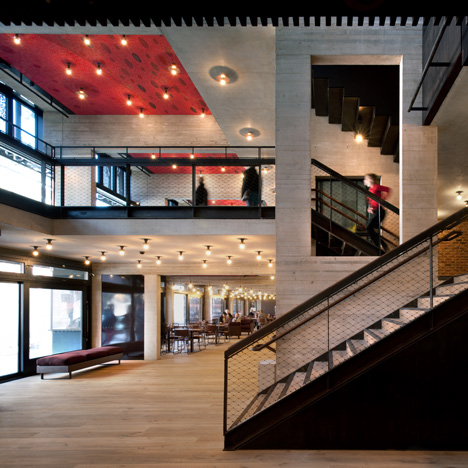
The golden age is over for public buildings in Britain, says Stirling Prize winner
News: architects in the UK are being "cut to the bone" by bureaucracy says architect Steve Tompkins, whose firm won the RIBA Stirling Prize last night for the Liverpool Everyman Theatre (+ interview).
Haworth Tompkins' Everyman Theatre was named the best new building in Britain, beating works by leading architects including Zaha Hadid, RIBA Gold Medal winners O'Donnell and Tuomey, and Renzo Piano.
Speaking to Dezeen after the ceremony at the Royal Institute of British Architects last night, Tompkins said that architects in Britain were under pressure to "dumb down" to meet the demands of clients and the "depressing" procurement system in the UK.

"There's so much pressure to speed up and dumb down in terms of the way architects are being asked to work and we've always tried to resist that as a practice. Our practice is very much craft based and time based. We can't do what we do quickly," he told Dezeen.
"The whole procurement industry in the UK sometimes feels very depressing. It feels like there's more and more of a schism between the craft of the architects and the voice of the client."
Tompkins said the current system for commissioning public buildings in Britain was "unsustainable" and would create a profession of "exhausted and demoralised" architects.
"There's so many interfaces of bureaucracy and so many hurdles and tasks to half design the building before you get the commission. It feels very exhausting and demoralising to be doing that constantly and also incredibly wasteful of collective resources in the profession."
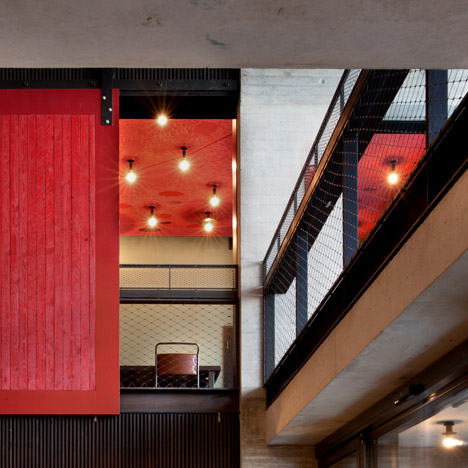
"The quality of the work what you can do once you get a commission suffers because you spent all of your resources trying to get the job," he said. "Anybody that's trying to do serious thoughtful work is being asked to produce images too quickly and being cut to the bone to an extent one can't think enough about a job."
The Everyman in Liverpool was Haworth Tompkins' first new-build theatre project. The firm has previously completed the refurbishment work for the Young Vic theatre in London's Waterloo area, and is currently responsible for the ongoing extension and refurbishment of Denys Lasdun's National Theatre on the Southbank.
Tompkins said he was happy to be developing a reputation as a theatre specialist.
"They are such brilliant projects to work on. You tend to find a calibre of client that is informed, passionate, practical, emotional intelligent, and instinctively collaborative," Tompkins told Dezeen.
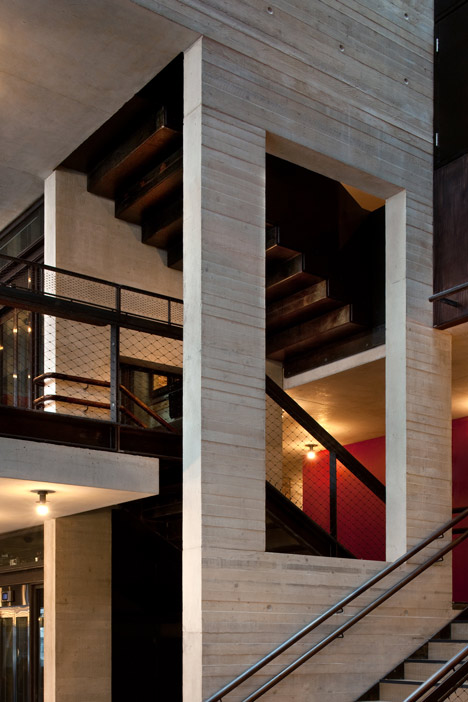
"Plus the fact that they're public buildings, they have cache and often they have a budget – all of those things mean that it's a nice place to be in."
But he said that the firm had been "lucky" to be building during a period of heavy public spending, and was now having to look further afield for future projects, as funding in the UK dries up.
Among the countries it is currently working in are New Zealand and Lebanon.
"We were so lucky to catch the wave with the Royal Court and through that whole surge of publicly funded theatres," he said. "We were very much at the right place at the right time and I think there's less of an appetite now."
"I hope the cache and the profile from the award will find us other channels for us to do what we want to do. I hope it doesn't change the way we work."
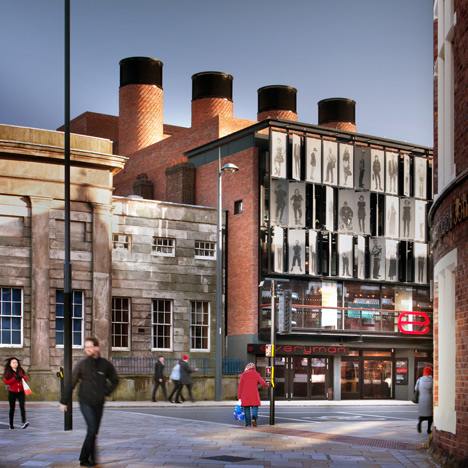
Read the edited transcript from our interview with Steve Tompkins:
Anna Winston: Congratulations.
Steve Tompkins: Thank you, it's really amazing, really amazing. Unexpected, of course you can never predict with a shortlist like that which way it's going to go, so. We had no fixed expectation at all but now we've won it's just extraordinary, it's an extraordinary feeling.
Anna Winston: Did you have any idea that this was a project that was going to win you prizes when you started? Was that an aspiration?
Steve Tompkins: You can never try and predict that stuff but the building has had an incredibly happy trajectory. It's been one of those projects where every part of the team has reinforced another part and quite quickly you establish, you know, a really strong relationship of trust and candour. That's infectious on a project. I think it has brought the best out in everybody.
Anna Winston: It very easily could have gone wrong – the original building was very loved.
Steve Tompkins: Yes. There was a lot of jeopardy in the project. But it's also a spur to take enough risk to bust through it and get to something which feels genuinely new but also has the capacity to evoke the quality of the old building. It's felt like a difficult thing to pull off. It feels like a balance to strike and I think it's taken all of our resources to try and make that look easy.
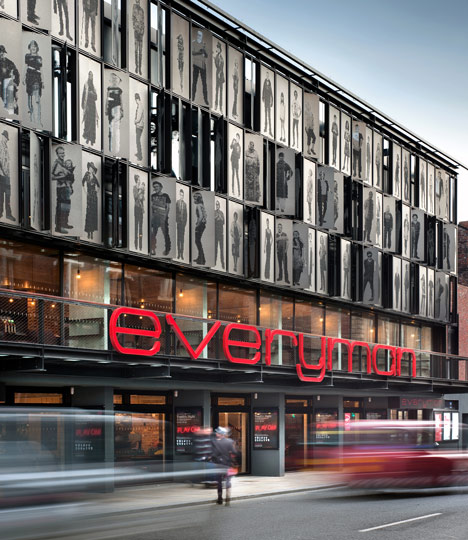
Anna Winston: You're getting a bit of a reputation for doing theatre buildings…
Steve Tompkins: We are and I hope it continues because they are such brilliant projects to work on. You tend to find a calibre of client that is informed, passionate, practical, emotional intelligent, and instinctively collaborative. All of those things are a gift to an architect who likes to work in the way we do. Plus the fact that they're public buildings and they have cache and often they have a budget – all of those things mean that it's a nice place to be in. Having said that, the Everyman is the first new build we've done in that field, which was an easy thing for us to forget, let alone anyone else.
Anna Winston: The National Theatre is an extension, really, isn't it?
Steve Tompkins: The National is really very much a labour of love but also very much a duty of care, this is a very delicate important building. And like the Everyman, those physical manifestations have to pay honour to the history of the National but also to have the courage, and to an extent the insouciance, to play a little with it, because that's the only way you'll move forward, but in a way that one hopes Lasdun would support. If its too slavish, or too deferential it would be pointless.
The National as an artefact is infinitely more important and rightly it has a constituency of protectors and apologists, which again rightly need to be convinced about what's happening. But that's just the nature of the beast and as I say you have to go at that with a degree of courage otherwise you're lost.
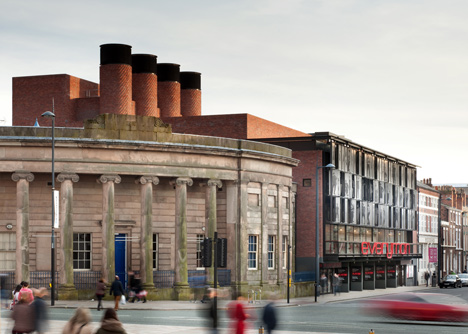
Anna Winston: Are you considering any more theatre projects in the UK or are you having to look further afield now?
Steve Tompkins: The latter. We're definitely having to look further afield. We're doing some work in Christchurch at the moment at the earthquake centre with the theatre there. We've been having some other conversations further afield. I've just come back from Jordan where I've been to talking to some Arab practitioners often in very vulnerable delicate situations. In a way that's a social and intellectual pro-bono exercise, rather than looking for the next big project, but I think it all adds up to a body of research which bears fruit in unexpected ways and at unexpected times.
Anna Winston: Do you think the golden age of public building is over for now?
Steve Tompkins: I think that's probably right. I think certainly with the public National Lottery funding we were so lucky to catch the wave with the Royal Court and through that whole surge of publicly funded theatres. We were very much at the right place at the right time and I think there's less of an appetite now. That's partly because the work has been done for this generation, and someone doesn't want to keep flogging a dead horse with jobs that don't need doing. But there's a lot of work that can be extrapolated out of the work we've been doing in the UK and I think as a practice we probably feel a level of readiness and maturity to tackle that in a way we probably wouldn't have done five years ago. Winning the Stirling Prize is probably not unhelpful in that respect.
Anna Winston: Do you think that the win is going to change the kind of clients that approach you?
Steve Tompkins: At the moment, in the heat of the moment, it just feels like the most lovely endorsement of the way that we have been working. There's so much pressure to speed up and dumb down in terms of the way architects are being asked to work and we've always tried to resist that as a practice. Our practice is very much craft based and time based. We can't do what we do quickly, but what we can do is keep learning. So in a way I hope the cache and the profile from the award will find us other channels for us to do what we want to do. I hope it doesn't change the way we work.
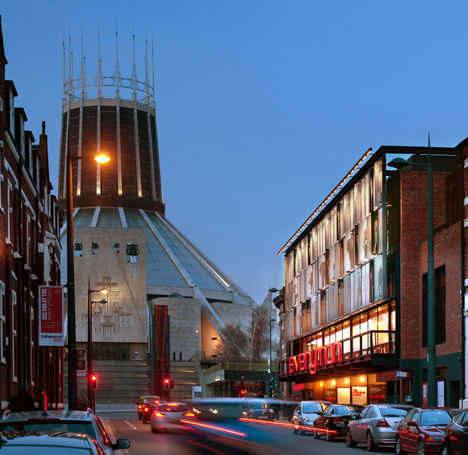
Anna Winston: Where do you think that pressure comes from – to be faster and produce more and more?
Steve Tompkins: The whole procurement industry in the UK sometimes feels very depressing to us. It feels like there's more and more of a schism between the craft of the architects and the voice of the client that actually will express the need of the building. There's so many interfaces of bureaucracy and so many hurdles and tasks to half design the building before you get the commission. It feels very exhausting and demoralising to be doing that constantly and also incredibly wasteful of collective resources in the profession. It seems to me like it's a limited amount of time that that's sustainable before we all become exhausted and demoralised, and the quality of the work that you can do once you get a commission suffers because you spent all of your resources trying to get the job.
Anna Winston: Have you seen that happen elsewhere?
Steve Tompkins: Well it's certainly happening to us! So we speak from personal and bitter experience but I'm sure our experiences are by no means unique. Anybody that's trying to do serious thoughtful work is being asked to produce images too quickly and being cut to the bone to an extent one can't think enough about a job. That does feel difficult and it feels systematically problematic.